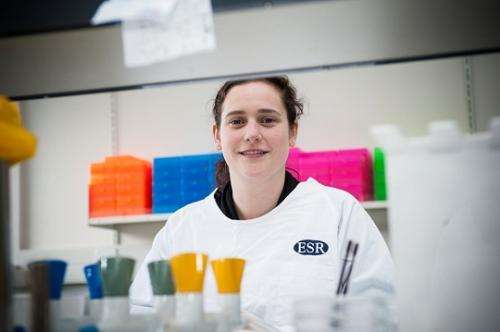Study delivers new information on preventing spread of meningitis

(Medical Xpress)—Research by a Victoria University PhD graduate has highlighted the risk of contracting the disease through sharing things like drink bottles and glasses.
Dr Claire Swain's work has shown that meningococcal bacteria can survive outside the body for periods ranging from four hours to seven days, and that environmental conditions are a key factor in survival rates for the bacteria.
"The relationship between temperature and humidity is crucial," she says. "The New Zealand epidemic strain survived really well during winter and significantly worse during summer, which fits in with the seasonal epidemic rates of meningococcal disease in the western world."
Dr Swain has been researching meningococcal bacteria for the past eight years. Her work breaks new ground in a field that has had relatively little scientific attention in the past 100 years.
"A study at the beginning of the 20th Century showed the bacteria could not survive outside the host. It was looked at again in the 1940s and the late 1960s and there were indications they could survive, but the results were limited and it's had scant attention since then. There was little previous work to build on, and I had to design all my own protocols."
The results of Dr Swain's Honours research challenged a widely held view that the bacteria are temperamental and unable to survive for long periods outside the human body.
Using artificial saliva made and donated by the University of Otago's School of Dentistry, she tested survival rates for a selection of strains on both plastic and glass, including the serogroup B strain which caused an epidemic in New Zealand through the 1990s and early 2000s.
She found that the bacteria of every strain that was tested could survive drying, in one case for up to 10 days. The bacteria lasted significantly longer on glass than on plastic.
Dr Swain says scientists do not know what constitutes an infectious dose of the bacteria as meningococci do not affect animals in the same way they affect humans, so cannot be studied through animal models.
"Despite that, the potential risk of transferring the disease is clear," says Dr Swain. "People carrying meningococci could leave infectious bacteria through saliva on bottles, glasses and cutlery.
"They may not even have to put the implement in their mouth to transfer the bacteria—sneezing on it might be enough."
Dr Swain says her work has implications for researchers working with the bacteria, and health professionals working with people who have the infection, as well as friends and family of people with infectious meningococcal bacteria.
Dr Swain's PhD research expanded on her earlier findings by studying the growth of meningococcal bacteria under different environmental conditions.
She examined a subset of seven of the most common strains of the disease in ambient, warm and cold conditions, and low humidities.
A total of 13 serogroups of meningococcal bacteria have been identified and five of them—A, B, C, W135 and Y—can cause epidemics. Dr Swain says her results show that different serogroups have different survival rates, but that's only one factor in their potency.
"The interaction between temperature and humidity is also crucial. Except for one strain type, all the strains I tested survived better at lower relative humidity compared with ambient temperatures."
Dr Swain's PhD work also looked at proteins expressed in response to environmental stress by two strains of the bacteria with differing abilities to survive in the environment. Her goal was to identify the reason behind the differences and, as a result, try to find a marker that could predict if a particular strain could be a strong survivor and was therefore more likely to cause an epidemic.
Dr Swain's work, which found a stark contrast in how the two strains cope with stress, has taken the first steps towards this goal. She says future work in this area could lead to identification of a marker.
















